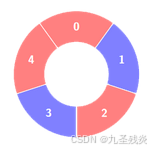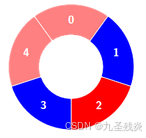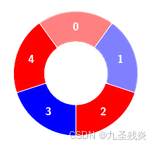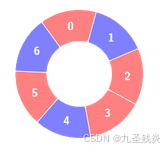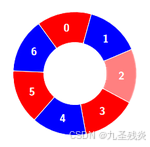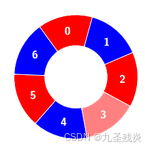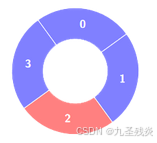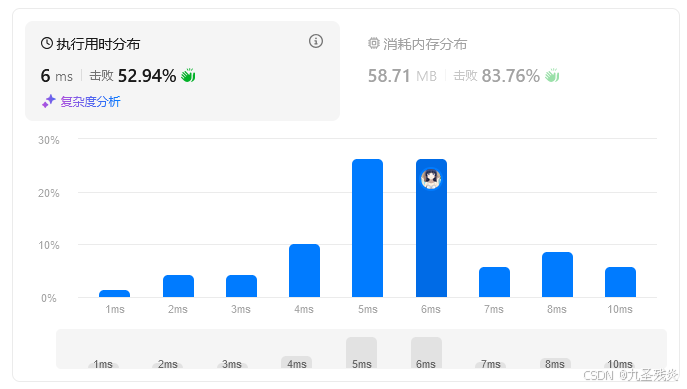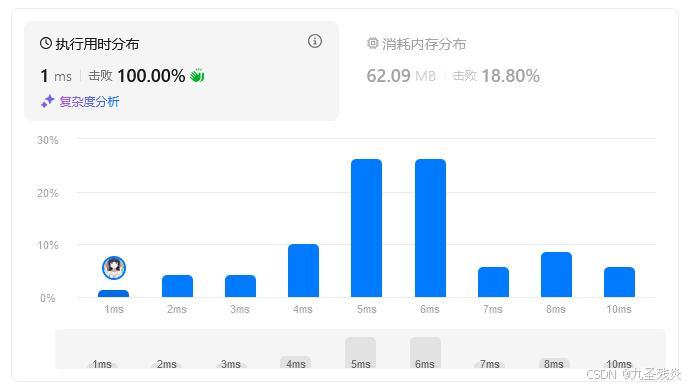给你一个整数数组 colors 和一个整数 k ,colors表示一个由红色和蓝色瓷砖组成的环,第 i 块瓷砖的颜色为 colors[i] :
colors[i] == 0表示第i块瓷砖的颜色是 红色 。colors[i] == 1表示第i块瓷砖的颜色是 蓝色 。
环中连续 k 块瓷砖的颜色如果是 交替 颜色(也就是说除了第一块和最后一块瓷砖以外,中间瓷砖的颜色与它 左边 和 右边 的颜色都不同),那么它被称为一个 交替 组。
请你返回 交替 组的数目。
注意 ,由于 colors 表示一个 环 ,第一块 瓷砖和 最后一块 瓷砖是相邻的。
示例 1:
输入:colors = [0,1,0,1,0], k = 3
输出:3
解释:
交替组包括:
示例 2:
输入:colors = [0,1,0,0,1,0,1], k = 6
输出:2
解释:
交替组包括:
示例 3:
输入:colors = [1,1,0,1], k = 4
输出:0
解释:
提示:
3 <= colors.length <= 10^50 <= colors[i] <= 13 <= k <= colors.length
我的解答:
class Solution {
public int numberOfAlternatingGroups(int[] colors, int k) {
int size = colors.length;
int res = 0;
int[] new_colors = new int[2 * size];
int new_size = new_colors.length;
for(int i = 1; i < new_size; i++){
int p = (i - 1) % size;
int l = i % size;
if(colors[p] != colors[l]){
new_colors[i] = new_colors[i - 1] + 1;
// 如果元素在拓展位置且所在交替组的长度大于k,则说明以该元素为终点的交替组满足条件
if(i >= size && new_colors[i] >= k - 1) res++;
}
}
return res;
}
}优化
class Solution {
public int numberOfAlternatingGroups(int[] colors, int k) {
int size = colors.length - 1;
int res = 0;
int first_len = -1; // 记录从0开始的首个交替组长度
int current_len = 1; // 以当前元素为终点的交替组的长度
for(int i = 1; i <= size; i++){
// 如果当前元素与上一元素相同,则表示交替组中断
if(colors[i] == colors[i-1]){
if(first_len == -1){
// 更新首个交替组
first_len = current_len;
}else{
// 上一交替组中满足条件的组数
res += Math.max(0,current_len - k + 1);
}
current_len = 1;
}
else{
current_len++;
}
}
if(colors[0] != colors[size]){
// 如果以尾元素为终点的交替组长度大于等于圆的长度,那么说明整个圆是循环交替的
if(current_len > size) return size + 1;
res += Math.max(0,(current_len + first_len - k + 1));
}else{
res += Math.max(0,(current_len - k + 1)) + Math.max(0,(first_len - k + 1));
}
return res;
}
}